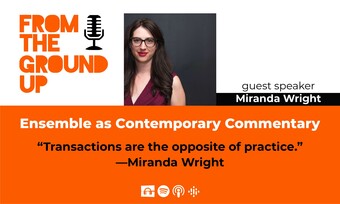Paying Dues and the Social Contract
In late June, The New York Times published an article comprised of a series of interviews with actors working on The Flea Theater’s recently closed production The Mysteries. The interview questions focus on how the actors managed to get by working a forty-hour work week at the theater without pay, whether it be by taking a night job at a bar, unemployment, or getting a gig with Google on the side. What it didn’t do, however, is really delve into the one question that I desperately want to ask; though it mentioned how actors are required to volunteer on top of their acting duties, it never did more than glance at the real “why” involved. Why would these actors be willing to work for free in a company where everyone else is getting paid? Why is their artistic work so undervalued financially when compared with that of a director or playwright or technician? It’s important to note that this isn’t community or independent theater. The Flea operates on a million dollar budget and is set to open a new multi-million dollar space. Nor is the Flea the only theater that operates in this sort of manner—Theatre for a New Audience (TFANA) just opened a mammoth sixty million dollar center in Fort Greene, and pays their nonunion actors $125 a week for over forty hours of work. It’s one thing to be working with smaller companies where nobody is making any money, but why do actors accept this sort of un-or-barely-paid work at organizations where everybody else is making at least a living wage?
The most obviously alluring aspect of a job like this is the opportunity for actors to be seen by industry insiders with the hopes of making a name for themselves, which will help their chances of booking jobs in the future. I spoke with Stephanie Bunch, a nonunion actor who just finished her MFA at Brooklyn College, on the subject. She recently had a significant speaking role in TFANA’s production of The Killer starring Michael Shannon. When I asked if she would return to TFANA or work for free at The Flea, Ms. Bunch replied that she would, “If I considered myself to be reaping benefits, if I knew a lot of the industry would see my work or I would make connections to and with more experienced artists.” That’s another common refrain that comes up in this discussion—the chance to work alongside fantastic actors and with award-winning directors is worth the financial hardship that comes along with working long hours for little to no pay. In other words, the artistic merits or the learning opportunities make up for the downsides of the job. Ms. Bunch also said she believes all actors should be paid, but in the long run she believes that experience can often be more valuable long term than financial reward. All of this ties into the concept of “paying your dues:” the thought that young artists of all stripes must go through a period of difficulty and often abject poverty before they are allowed to succeed. We glorify this notion in print and conversation. Pieces like that article in The New York Times serve to legitimize and emphasize this process as a positive—or at least necessary—part of the profession. Several of the actors profiled in the article mentioned that the exposure of working for a prestigious theater will be worthwhile for them in the long run, despite what difficulties it causes in the present.
I wonder if that’s really true. Of course, it’s impossible to measure the intangible benefits that often come with the territory of working alongside more experienced actors and directors. However, from a logical standpoint, we can consider that the number of paid work weeks reported by Actors’ Equity was steadily declining as recently as 2012. And while the number of weeks worked by union members finally grew in 2013, overall actor earnings fell due to “a shift of employment to lower-paying contracts.” So we have more and more actors joining the ranks of the nonunion performer—The Flea boasts of having over a thousand actors audition every year to join their ensemble of nonunion unpaid actors known as “The Bats”—and fewer jobs available for already established actors. It’s just hard to imagine that “exposure” can really make up for the economic reality of the situation. The math just doesn’t add up.
“Paying your dues”—it’s a pervasive refrain, and one that clearly lives deeply within us; it has gotten under our skin and through our veins. I can’t help but think that it’s a lie. The concept of “paying dues” implies a sort of social contract that’s simply no longer present, if it ever was. We pay our union dues or federal taxes with the understanding that while it won’t come directly back to us, we’re paying in to a system that will eventually benefit the group at large. This system of theatrical dues paying comes back to benefit only a very small percentage of the population buying in. Are there those who appear in nonunion productions, get noticed, get hired and then make a living acting? Of course. But that won’t ever be the norm. I think the thing most fascinating to me—and prevalent not just among young actors, but also directors, playwrights, designers, everybody—is that we know this. We know that logically, most of us can’t succeed. We all manage, myself included, to convince ourselves that we’ll be the ones who do make it, that we’ll be the ones to make a living, and these companies are able to capitalize on this mindset. As long as young artists are led to believe that it’s okay to be exploited in the hope of future gains, however unlikely they might actually be, they’ll continue to be exploited. There’s no easy solution, but we have to start from somewhere. For me, that somewhere is here: recognizing that there’s value to this theoretical social contract, and that exploitation thinly veiled as “paying dues” serves only to malign and mislead those upon who the profession will need to lean on most heavily in the future.












Comments
The article is just the start of the conversation—we want to know what you think about this subject, too! HowlRound is a space for knowledge-sharing, and we welcome spirited, thoughtful, and on-topic dialogue. Find our full comments policy here
While I also wondered (like previous commentors) what the heck the Flea (and others) are doing with all that money, more fundamentally I think the solution to the problem lies in having a far more robust economy to begin with. And that means being conscious of our purchasing decisions and (most important of all) what our "leaders" are up to.
For instance, not supporting people who think a trillion dollars (one thousand billion!) a year should be taking out of our economy and spent on interfering in conflicts overseas, even if that person is a woman (H. Clinton, Barbara Boxer) or "of color". (Yes, I know the republicans are far worse, but that doesn't mean we can simply ignore what someone stands for simply because they claim to be a democrat. We should only support traditional "peace" type democrats.)
It also means looking at what we watch, what we wear, what we drive, what we eat and being aware of when we are buying foreign products instead of those that support our domestic economy. Even if this means (as one example) simply getting by (as I do) with an old TV, paying the guy at the local repair shop once in a while, rather than buying an expensive new (foreign-made) TV.
In Canada our major theatre institutions operate under the CTA (Canadian Theatre Agreement). It used to be that there was no minimum fee for non-Equity performers (apprentices), but the agreements been changed. Now all artists must be engaged under an equity contract and there is a minimum fee for everyone cast. There is still debate about the merit of this system - but it levels out the playing field. There is no advantage to casting a non-union performer - which means non-union artists really have to earn their role. And everyone is getting paid a reasonable salary. It may create less work weeks for artists because producers will need to pay more for talent. Meaning they may have to consider shows with smaller casts to balance the budgets. It's all still quite new so we'll see how much it impacts the industry in the years to come.
Thank you for bringing up these issues. I think "paying dues" is certainly part of the cultural thinking as to why nonunion actors are paid so little; I think another part is that nonunion actors are still considered "nonprofessional" and therefore not deserving of "professional" pay. This thinking is another aspect of AEA that needs to be revisited. For those of us who have always chosen to live outside of NYC (and increasingly, professional actors and theater practitioners are living elsewhere), unless you live in one of about three cities in the entire country, "going Equity" makes no sense, because there may only be two or three Equity houses in your city, and they may not represent the best theater in the city. And cyclically, because there are only a few Equity actors in such a city, the Equity houses must import most of their casts from out of town, usually NYC. This cycle never allows for a city to build a community of professional, decently paid actors who have an investment in that larger community.
So what I think we really need to go back and ask is "what does it mean to be a professional?" And, "how can that be reflected in monetary compensation and opportunities in professional theaters?" To me, Equity no longer represents the way that theater artists are making theater professionally in this country, and I think it's time to revisit the laws.
As a young artist coming from an impoverished family, I saw many of my peers moving ahead in their careers as a result of taking non-paying or less-than-living-wage paying jobs. It strikes me that the reason that our theater usually speaks from a privileged point of view and thus is not patronized by middle and lower-middle class audiences is that this system selects out those gifted individual who cannot get family help to meet rent.
I got along fine but moving into academia with its steady paycheck. But that was as more by luck than design. But I saw many writers, directors, and actors far more gifted than myself, eventually leave theater because you can only keep doing brilliant shoestring work off-off-Broadway for so long before you just want to take a vacation, buy a car, or save for retirement.
Our system makes sure that non-privileged are weeded out before they can change the status quo.
Well put! (I am also from a poor family -- especially compared to the north shore types that so many in theater seem to come from.)
Thank you for bringing up this important issue, Greg. I am heartened to see that, in recent months, more and more people are addressing this critical issue, which I believe is critically harming our industry. There seems to be a significant disparity within the wealth distribution in the performing arts. How can actors earn only $100--about 39% of New York state´s minimum wage--from a theater (such as The Flea) that has an annual budget of $1,000,000,000? Where is all the money going?
I´m skeptical of this "social contract", as the majority of the time, "paying one´s dues" is not an investment that pays off for any of these actors. And this is just those in AEA. This does not count the majority of actors who are not in the union, but strive to be. Plus, what about all of the other costs actors (and dancers, choreographers, playwrights, directors) are expected to pay out-of-pocket, in terms of gaining this "exposure"?
Unfortunately, this seems like another example of the failure of the American Dream within the last couple of generations (at least). The idea that, if one works hard and "pays one´s dues" by agreeing to unpaid work as an actor or playwright or director, because down the road--some day, in some hazy future--one will then get a living wage, will "make it"--when has this been a reality for those living and working in this field?
And, as you pointed out, if this is something we all know, and we all feel frustrated by...where is the outrage? Where is the critical mass of people in our field saying, "ENOUGH", instead of perpetuating this terrible belief that "this is just the way it is"?
It would be great if we could examine a number of theaters that pay actors $100/ week for 40 hours of work a week, but who have annual budgets of $1 million. Would be helpful to see the complete breakdown of finances, salaries, and expenses. I´m not saying necessarily The Flea, but a cross-section of these theatre´s expenditure would be informative, as I suspect that there is a (significant) difference between what the (large) artistic staff is earning within a $1 million dollar budget, and the (smaller) administrative staff.
Of course, a number of actors have been proactive throughout time in the face of this state of affairs. Typically, this is one of the factors for a band of actors to join together to form their own company, and assert more of their own control of the whole product--from getting good parts into the roles they are cast in, to how they are marketing, and presumably more control of the purse-strings. The Atlantic Theater Company, Steppenwolf, the Wooster Group, Mabou Mines, SITI Company, the list could be added ad infinitum. Yet how many undergraduate or graduate programs train actors in how to start their own business, and manage it successfully?
But not every actor wants to also be a manager, or an artistic director, or a producer. What about actors who just want to act? How can we collectively change our industry, so that these talented artists, already burdened with exorbitant debt, don´t have to think earning $100/week is somehow a "gift" for working more than full-time.
Actors pay to go to universities, take expensive courses, and go into debt in order to learn their craft from teachers in classrooms. At the Flea, actors volunteer to collaborate with working artists, perform in front of paying audiences, and learn their craft. I feel like The Flea is a better deal.
It's weird because you acknowledge that there is no guaranteed way to make money or have a career as a artist, but you assume that Flea actors don't know this, and must be volunteering because they've been promised results that may never arrive. In my experience, The Bats have their eyes wide open about this. You assume a "false consciousness" to make your argument.
But you're missing the fact that a lot of young actors join the Bats as an alternative to grad school. A FREE alternative to grad school. And they are not doing "scene study" at the Flea, they are performing in new plays in front of New York audiences. Can you see how this has value for a young artist?
What if you thought about the Bats as young people who are continuing their education and their training as members of a working ensemble? When I think of "paying your dues", I think of the nightmare of going on cattle calls, searching for voiceover and commercial work, competing against your peers, becoming atomized within a huge industry, going it alone trying to "rise to the top", I don't think about the community vibe at the Flea.
Thank you for your comment, Morsicatia. I hope that any of the actors working at the Flea for $100/week are experiencing in the positive terms that you describe.
Working in the field is definitely a viable alternative to going to graduate school. I would only respond by saying that not all graduate programs are the same--many are far more than "just doing scene study", and some provide one with the chance to not only work in front of astute audiences (in and beyond New York City), but also work with notable directors, designers, playwrights, and faculty. Not to mention to form their own ensemble amongst the peers they study alongside, many of whom will have professional and/or personal relationships for a lifetime.
But of course, not every grad school is like that. Just as not every working experience in a venue in a major city like New York yields the kind of benefits, outcomes, or goals that those actors who are working full-time to support their "free" graduate program.
Ultimately, it seems as though your argument is positing A versus B, with A = expensive graduate school and debt, versus B = "free" on-the-boards education in the field.
My position is that I think we need to change both of these things: the cost of education (undergraduate and graduate) for the arts is growing increasingly absurd, making it more challenging for those without financial means to pursue not just the craft of acting, but also its history, the myriad techniques of the art-form, and the ability to experiment within an environment without the pressure of always delivering a product or performance.
Similarly, I think the distribution of wealth and income in our section of the live performing arts, particularly theater and dance, also needs to change. $100/week in a major metropolitan American city, in 2014? It´s not tenable or justifiable. Rather than find creative ways to newly perceive a broken system, let´s use our collective imaginations and ingenuity to solve the problem, and provide all of our hard-working artists--whom we agree are in debt, in an unpredictable profession, in a competitive career--when they DO work, let´s give them a better wage. One they can actually live on.
Good for you, Greg, for bringing this up. It is a chronic problem and one I have struggled with for years - as an actor/writer, and as a producer, director, playwright and venue owner. Yes, we actors work for nothing all the time, and make huge sacrifices to do it. What this leads to is audiences who expect tickets for half price or free, and venues, like mine, that are closing because the ticket income is not enough to pay the rent, much less pay the actors. I am moving out of NYC next summer and will see if I can have a theater in a smaller town where all the income doesn't go to the rent, and where the actors can be guaranteed at least a percentage of the box office, or a small fee. They deserve something more than the Metrocard mandated by Equity showcase contracts, or worse, the nothing at all from a non-union contract. But it's true that most of us will never see a dime for our work. It's a sad thing when playwrights must pay for an entire production out of their pockets. When my young clients ask me about whether they should consider show business as a career, I urge them to consider any other career path. If they simply MUST act, or write plays and solo shows, then they should do it for the joy, and not because they think it might lead somewhere other than the intrinsic joy of doing it. Then if, by some combination of hard work, luck and miracle, they actually DO make money in theater, it will be a bonus.
When artists (including actors) agree to work "for the joy of it" or "for exposure" the wages of the entire sector are depressed, helping nobody. Working to learn along side master artists is a slightly different situation, but careful consideration should be given to the pros and cons. http://creativeinfrastructu...
I agree. Yet often the only other option is not working at all - which is also unacceptable. It's a conundrum, to be sure.